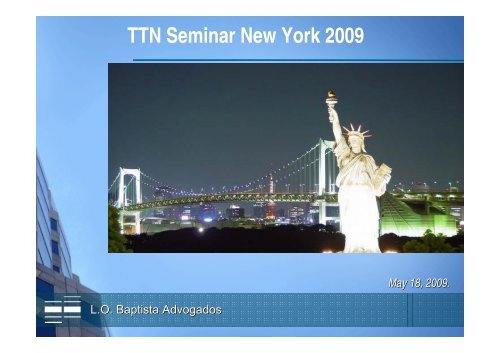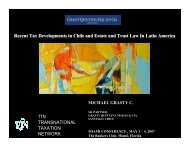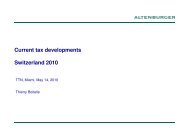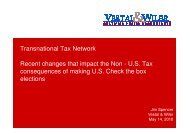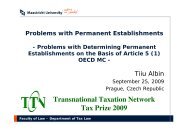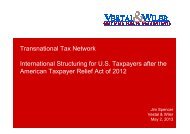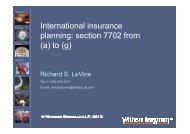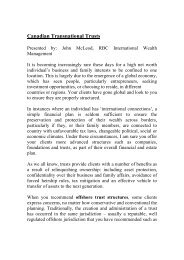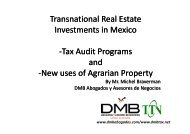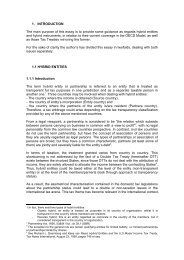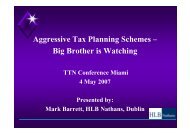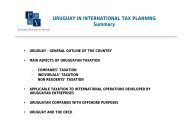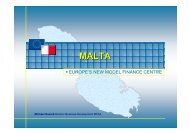Hybrid Entities
Hybrid Entities
Hybrid Entities
You also want an ePaper? Increase the reach of your titles
YUMPU automatically turns print PDFs into web optimized ePapers that Google loves.
TTN Seminar New York 2009<br />
May 18, 2009.<br />
L.O. Baptista Advogados
L.O. Baptista Advogados<br />
<strong>Hybrid</strong> <strong>Entities</strong> and Instruments:<br />
Are They Adequately Covered in the OECD Model<br />
Convention?<br />
Leonardo F. de M. e Castro<br />
Master in Tax Law (University of São Paulo – USP)<br />
LLM in International Tax Law (Brazilian Institute of Tax Law - IBDT)<br />
Professor of Tax Law and Attorney-at-Law in Brazil
The Problem Regarding <strong>Hybrid</strong> <strong>Entities</strong> and<br />
<strong>Hybrid</strong> Instruments<br />
1) Qualification Problems<br />
A) What are <strong>Hybrid</strong> <strong>Entities</strong>?<br />
- Concept of “persons”;<br />
-Term “Liable to tax”;<br />
-Term “Beneficial Owner”;<br />
-Term “Paid to”.<br />
B) What kind of income is generated<br />
by <strong>Hybrid</strong> Instruments?<br />
- Dividend (Art. 10);<br />
- Interests (Art. 11);<br />
- Other Income (Art. 21).<br />
2) Interpretation Problems<br />
A) Regarding <strong>Hybrid</strong> <strong>Entities</strong><br />
- Partnerships;<br />
- Trusts;<br />
- Foundations;<br />
- Investment Funds.<br />
B) Regarding <strong>Hybrid</strong> Instruments<br />
- Mostly Equity (dividends)<br />
- Mostly Debt (interests)<br />
- Sui Generis (other income)<br />
-Convertible instruments: time of<br />
investment and time of payment<br />
L.O. Baptista Advogados
Applicable Articles of The OECD Model<br />
Convention<br />
‣<strong>Hybrid</strong> <strong>Entities</strong> :<br />
• Article 1 - Persons Covered<br />
• Article 3 - General definitions<br />
• Article 4 – Resident<br />
• Chapter III - Taxation Of Income (Art. 6 to 21)<br />
‣ <strong>Hybrid</strong> Instruments :<br />
• Article 10 – Dividends<br />
• Article 11 – Interests<br />
• Article 21 – Other Income<br />
L.O. Baptista Advogados
<strong>Hybrid</strong> <strong>Entities</strong> and Treaty Entitlement<br />
in OECD MC<br />
‣ Definition: the term “hybrid entity” can be understood as any entity that can be treated<br />
either as a flow-through vehicle – definition for tax purposes X corporate law;<br />
‣ Issue: The Treaty Entitlement: The entitlement to the benefits of tax treaties, especially<br />
those that adopt the OCDE Model Convention, requires some conditions, which are:<br />
(i) to be included in the definition of “persons” (i.e., “persons” or “body of persons”);<br />
(ii) to be considered as “liable to tax”;<br />
(iii) to be considered as the beneficial owners of the income received according to art. 10,<br />
11 and 12 of OECD MC?; and<br />
(iv) that the income received by / transferred to such entities can be considered as “paid<br />
to” (Art. 10), “paid by” (Art. 11) or “payment” (Art. 12) by such vehicles.<br />
‣ Initial Solution: OECD created a Partnership Report (1999) to approach the application<br />
of the OECD model tax convention to partnerships.<br />
‣ OECD Partnership Report: provided important recommendations for the amendment of<br />
certain articles of the model convention and some of the related commentary.<br />
‣ Therefore, demonstrated that the <strong>Hybrid</strong> <strong>Entities</strong> (indirectly) - and the Partnership issue<br />
(directly) - is far from solved in the current Model Convention draft.<br />
L.O. Baptista Advogados
<strong>Hybrid</strong> <strong>Entities</strong> and Art. 3 of OCDE MC<br />
‣ The term “person” is defined by art. 3(1)(a) “as including an individual, a company and<br />
any other body of persons”.<br />
‣ OECD Commentaries: “3.2 (…) Thus, e.g. a foundation (Stiftung) may fall within the<br />
meaning of the term "person". Partnerships will also be considered to be "persons" either<br />
because they fall within the definition of "company" or, where this is not the case, because<br />
they constitute other bodies of persons (…).”<br />
‣ Thus, partnerships and foundations are also included in such definition. What about<br />
investment funds?<br />
‣ OECD Commentaries mention of funds: “8.2. (...) For example, pension funds,<br />
charities and other organizations (...)”. Can investment funds constitue other body of<br />
persons?<br />
‣ “Body corporate” can be defined as: “ any other taxable unit, although not incorporated,<br />
that is treated as a body corporate according to the tax law of the Contracting State in<br />
which it is organized”.<br />
‣ However, the term body or person is not expressly defined neither in the Model<br />
Convention nor in the Commentary.<br />
‣ Some hybrid entities like investment funds may constitute an “association of person”; not<br />
a “body of person” because they lack of independent identity (i.e. legal personality)<br />
‣ Commentary on Art.3, paragraph 2: expressly mentions that the terms “persons is to be<br />
used in a wide sense”,<br />
‣ General Report IFA Congress in 1997: Requirements for funds to be treated as person<br />
L.O. Baptista Advogados
<strong>Hybrid</strong> <strong>Entities</strong> and Art. 4 of OCDE MC<br />
‣ Liable to Tax X Subject to Tax;<br />
‣ Wide interpretation (“potential taxation”) X narrower interpretation (“actual taxation”)<br />
‣ OECD Commentaries: “8.2. Paragraph 1 refers to persons who are ‘liable to tax’ in a<br />
Contracting State under its laws by reason of various criteria. In many countries, a<br />
person is considered liable to comprehensive taxation even if the Contracting State<br />
does not in fact impose tax (…)” ;<br />
‣ According to LANG, the term ‘‘liable to tax” only requires the person to be a taxpayer,<br />
i.e., to be established in the applicable provision that such person is to one that may,<br />
eventually, pay the tax. In this sense, persons who are tax exempted are considered as<br />
liable to tax and, therefore, residents for Article 4 purposes).<br />
‣ In the other hand, the term “subject to tax” requires effective payment of tax by such<br />
person (and the certificate that proves such payment, for ex.).<br />
‣ Interpretation with regards to the “objective and purpose of the Convention” – avoid<br />
double taxation / avoid tax evasion<br />
L.O. Baptista Advogados
<strong>Hybrid</strong> <strong>Entities</strong> and Art. 10, 11, 12 of OCDE MC<br />
‣ Problem regarding “beneficial owner”: such term is not defined either in the Model<br />
Convention itself or in its Commentary.<br />
‣ Commentary on Art. 10: this term “has not to be used in a narrow technical sense”.<br />
‣ Agent, nominee or conduit companies, fiduciary or administrator: are not “beneficial<br />
owner” of income, as per OECD MC.<br />
‣ 1996 US Technical Explanation of art. 10 (2): the beneficial owner is defined as: “any<br />
person resident in Contracting State to whom that State attributes the dividend for<br />
purpose of its tax.”<br />
‣ Scope of this term: to fight treaty shopping (situation where a person who is not entitled<br />
to the benefits of a tax treaty makes use of a legal person in order to obtain those treaty<br />
benefits that are not available directly)<br />
‣ According to current wording of OECD MC, there is no prohibition that hybrid entities<br />
could be considered as the “beneficial owners” of the income received as per dividend,<br />
interest or royalties.<br />
‣ Possible Definition: the legal and effective owner of the income, as the permanent and<br />
final owner, regarding that transaction.<br />
‣ Relevant Cases: Indofood; Royal Bank of Scotland ; Prevost Inc.<br />
‣ Brazil: Volvo Case (sui generis: the Brazil-Japan Treaty did not have the “beneficial<br />
owner clause”).<br />
L.O. Baptista Advogados
<strong>Hybrid</strong> <strong>Entities</strong> and Art. 10, 11, 12 of OCDE MC<br />
‣ The definition of term “paid to” is not provided in the OECD MC;<br />
‣ When a term is not defined in OECD MC reference has to be made to the domestic law of<br />
the state applying the Treaty (according to Art. 3 (2) OECD MC)<br />
‣ Problem: Non application of tax treaty since the source State can understand that the<br />
hybrid entity is transparent. Therefore, tax relief cannot be granted, and double taxation<br />
may occur.<br />
‣ Solution: Principle stated in the Partnership Report – states that an item of income is<br />
paid to a resident of a Contracting State if the latter exercises its taxing power over the<br />
income;<br />
‣ VAN RAAD: The term “paid” has a very wide meaning, and refers to the fulfillment of the<br />
obligation to put funds at the disposal of the shareholder in the manner required by<br />
contract or by custom.<br />
‣ Paid or Payment can be understood as when the income is transferred to the party of the<br />
other contracting state, even when such entity is considered as transparent or when the<br />
tie breaker rule considers such entity not resident in that state, but in a third one.<br />
‣ Example in flow chart.<br />
L.O. Baptista Advogados
<strong>Hybrid</strong> Instruments and Income Qualification<br />
in the OCDE MC<br />
‣ The recent financial instruments cannot be clearly attributed to either equity or debt<br />
remuneration;<br />
‣ Yield qualification: dividend, interest or other income;<br />
‣ Wide range of classification. Examples: corporate shares; traditional loans; jouissance<br />
rights; convertible bonds; profit participation loans;<br />
‣ Debt (Art. 11) X Equity (Art. 10): 2 important aspects of such classification:<br />
‣ Deductibility: concerns the payable entity and the deductibility of the income paid. This<br />
means that the entity that pays any income qualified as interest to another, can consider<br />
such amounts paid as tax-deductible, reducing its tax base;<br />
‣ Taxation after distribution: From the investor’s point of view, the classification<br />
determines whether the payments received from the respective instrument will be treated<br />
as a dividend or as interest and, therefore, if such amounts will be taxed after distributed.<br />
‣ Double Non Taxation and Double Taxation may arise form hybrid instruments qualification<br />
of income: interest X dividends, depending on the Source or Residence State.<br />
‣ Re-classification of income: “flows through” entities are treated as transparent and,<br />
therefore, transform a income previously qualified as e certain type of income, and tax it<br />
at the individual level (and not the hybrid entity).<br />
L.O. Baptista Advogados
<strong>Hybrid</strong> Instruments and Art. 10 (Equity)<br />
in the OCDE MC<br />
‣ Dividend definition: Article 10 (3) OECD-MC:<br />
The term “dividends” as used in this Article means − income from shares, “jouissance”<br />
shares or “jouissance” rights, mining shares, founders’ shares or other rights not being<br />
debt-claims, participating in profits, − as well as income from other corporate rights, which<br />
is subjected to the same taxation treatment as income from shares by the laws of the<br />
State of which the company making the distribution is a resident<br />
‣ Wording of Art 10 (3): income from other corporate rights is affected by the reference to<br />
the national law of the source state.<br />
‣ Dividend qualification requires the instrument to be a “corporate right”<br />
‣ Also, a possible risk of the loss of the investment (as a shareholder)<br />
‣ Profit-participating right need (but not only);<br />
‣ However, the specific wording of Art 10 OECD-MC does not explicitly list these criteria;<br />
L.O. Baptista Advogados
<strong>Hybrid</strong> Instruments and Art. 11 (Debt)<br />
in the OCDE MC<br />
‣ Interest definition: Art 11 (3) of the OECD MC:<br />
The term "interest" as used in this Article means income from debt-claims of every kind,<br />
whether or not secured by mortgage and whether or not carrying a right to participate in<br />
the debtor's profits, and in particular, income from government securities and income from<br />
bonds or debentures, including premiums and prizes attaching to such securities, bonds<br />
or debentures.<br />
‣ No mention to the national law of the Contracting States (on contrary as Art. 10);<br />
‣ OECD Commentary “the definition covers practically all the kinds of income which are<br />
regarded as interest in the various domestic laws;<br />
‣ Problem: on one hand dividends constitute remunerations for making capital available;<br />
on the other hand debt claims which carry a right to participate in the debtor’s profits are<br />
explicitly covered by the definition of interest;<br />
‣ Interest: Yield of hybrid financial instruments which impart a participation in the<br />
entrepreneurial risk solely through a profit-participating right;<br />
‣ Dividend: hybrid instruments with a profit-participating right as well as a right to<br />
participate in the liquidation proceeds of the issuing company.<br />
L.O. Baptista Advogados
<strong>Hybrid</strong> Instruments and Art. 21 (Sui Generis)<br />
in the OCDE MC<br />
‣ Article 21 of the OECD MC provides a general rule to all the types of income not dealt<br />
with in the previous articles of the Convention<br />
‣ By the interpretation of the wording of Commentaries 1 on Article 21 of OECD MC, the<br />
“other income” article shall only be applicable in two cases: (i) to income of a class not<br />
expressly regulated; or (ii) to income from sources not expressly mentioned.<br />
‣ However, BAKER mentions that the English Revenue consider that payment under<br />
interest swaps and certain new financial instruments also fall within this Article 21.<br />
‣ In our opinion, unless expressly established in the tax treaty negotiated between the<br />
parties, i.e., if there is no specific provision mentioned that the classification of income<br />
from hybrid financial instruments will be taxed and dealt with according to Article 21, there<br />
is not possible to reach this conclusion<br />
‣ Several tax experts have already explained that Article 21 is not to be used often but,<br />
instead, as an exception. According to VOGEL the term “not dealt with” used in such<br />
article must be taken to mean “not unmistakably dealt with” and, thus, the author<br />
emphasizes that Article 21 is not designed to “remove difficulties of interpretation nor,<br />
even less, to settle them in favor of the State of residence”.<br />
‣ The types of income classified under this article are the ones considered as not very<br />
common, such as income from prizes, lottery, inheritance, gambling winnings,<br />
disablement pensions and social security payments.<br />
‣ But not for income regulated previously by other articles…<br />
L.O. Baptista Advogados
Conclusion<br />
‣ Lately, hybrid entities and hybrid (financial) instruments are a significant part of crossboarder<br />
transactions worldwide;<br />
‣ <strong>Hybrid</strong> <strong>Entities</strong>: analysis of the possible treaty entitlement to hybrid entities concerns the<br />
interpretation of several specific terms in the OECD MC, such as “body of person”,<br />
“resident”, “liable to tax”, “beneficial owner” and “paid to”;<br />
‣ The sole wording of OECD MC or its Commentaries is not sufficient to solve the problems<br />
related to such issue: lack of written regulation;<br />
‣ <strong>Hybrid</strong> Instruments: yield originated can be qualified as dividends (Art. 10) or interests<br />
(Art. 11), but should not be as other income (Art. 21);<br />
‣ The requirements to define “corporate right”, “profits participation” and “risk involved”/<br />
“participation on liquidation process” are not expressly mentioned in OECD MC or its<br />
Commentaries;<br />
‣ Current wording of OECD MC does not solve the problems generated by hybrid entities<br />
entitlement to treaty benefits: insufficient definition of body of persons and resident (ex:<br />
investment funds);<br />
‣ Also, the OECD MC text does not clearly helps the qualification on income generated by<br />
hybrid instruments, mainly financial ones, in article 10, article 11 or even art. 21;<br />
‣ Our Opinion: hybrid entities and the hybrid instruments are not adequately covered in the<br />
OECD Model Convention, nor in its Commentaries. The solution should not be reached<br />
by the amendment of the Commentaries, due to the soft law interpretation, retation, but in the<br />
OECD MC itself.<br />
L.O. Baptista Advogados
THANK YOU VERY<br />
MUCH!<br />
L.O. Baptista<br />
Advogados Associados<br />
www.baptista.com.br<br />
Leonardo F. de M. e Castro<br />
lfc@baptista.com.br<br />
Av. Paulista 1294 / 8º<br />
São Paulo SP Brasil<br />
67/69 Av Victor Hugo<br />
75116 Paris France<br />
L.O. Baptista Advogados


